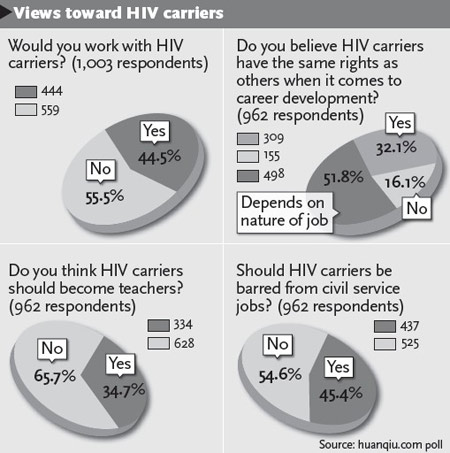Sick with discrimination
A two-bedroom apartment in Hongqiao district, Tianjin, serves as a care center for HIV carriers and AIDS patients during the day. At night, Ma Zhifa, 34, pushes some worktables together to form a makeshift bed.
It is the best Ma can do since he is unable to hold down a regular job.
He told the Global Times that he was fired from four jobs in the past two years after his co-workers told his bosses he used antiviral drugs.
He was fired from his last job earlier this year and has spent all his savings. He turned to the Tianjin Dark Blue Working Group, a non-governmental organization, where he receives free meals and an uncomfortable bed. "I just want to have a job and live a normal life like everybody else," Ma sighed.
Ma is just one of many people in China who face discrimination, according to a new report on the current state of HIV and AIDS that concluded there's "a trend of increasing discrimination against workers with the virus."
The report was published jointly by the Policy Research and Information Division of NCAIDS, the Chinese Center for Disease Control and Prevention, and the Beijing Office of the International Labor Organization.
The Ministry of Health said 740,000 people were living with HIV and AIDS last year. A report by UNAIDS last year said more than 40 percent of people with HIV experienced discrimination and nearly one in six was refused employment because of their HIV status.
Kitchen bias
One of the jobs Ma had was in a restaurant kitchen where he earned 1,500 yuan ($225) a month. He was dismissed after the employer learned about his health problem last year.
The catering industry is known for being closed to HIV carriers and AIDS patients, according to the Guideline for the Implementation of "Public Places Sanitation Regulation" developed in 1991.
The rules say that people with sexually transmitted diseases are barred from working in certain public places as hotels, cafes, bars and beauty salons.
The report also identified other sectors including civil service jobs, law enforcement and medical sectors as being off limits to AIDS patients and HIV carriers. In the health sector, routine medical tests are used to prevent people with HIV from working in hospitals, clinics and other health facilities.
"Employment discrimination against people with HIV is particularly difficult to tackle given it is embedded in some policies and rules advocated by the Chinese government," the report said.
Yu Fangqiang, a coordinator of Beijing-based civil-rights advocacy group Yirenping, urged authorities to revise the health qualification of civil servants to help patients obtain civil service jobs. "Such a regulation serves as a bad example and will only increase the stigma toward this disease," Yu said, adding that the standard used by the government has a profound impact on the society.
The health qualification criteria for civil servants are also applied in other professions including teaching and other public institutions.
Last month, a court in Anhui Province ruled against a man who claimed he was illegally denied a teaching job because he was HIV positive. His lawyer cited the Regulation on the Prevention and Control of AIDS issued by the State council in 2006, which said "employers and individuals should not discriminate against people living HIV and AIDS."
"The problem with the laws in China is that they are too general, they touch on the issue but lack details," Yu said.
 0
0 








Go to Forum >>0 Comments